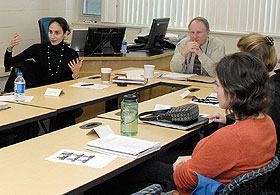  |
| HOME | THIS ISSUE | CALENDAR | GRANTS | BACK ISSUES | < BACK | NEXT > |
Courses improves TAs teaching skills, offers additional qualificationby Elizabeth Omara-Otunnu - November 13, 2007 | |||
| When a small but growing group of UConn teaching assistants graduate, they will have credentials not only in their academic specialties, but also in education. Those students have taken one or more courses with Keith Barker, director of the Institute for Teaching and Learning, who offers three education courses for TAs through the Neag School’s Department of Curriculum and Instruction. The cluster of courses includes a one-credit introductory course, a two-credit seminar, and a three-credit independent study. More than 180 graduate students have taken the one-credit course, now in its ninth year. The seminar accommodates six to eight students at a time, and the independent study is offered on demand. “In many of UConn’s Ph.D. programs, students are required to earn six credits outside the discipline,” says Barker, a professor of computer science and engineering. “They can get them here. “These courses give TAs certification,” he adds. “Not only have they had practical experience in teaching, they have taken courses on education and had experiences that made them better teachers.” The heart of Barker’s approach is the seminar class, which meets every two weeks for two hours during the fall semester. Co-taught with David Moss and John Settlage, associate professors of curriculum and instruction, each session focuses on an area that one of the TAs identifies as a challenge in his or her teaching. “This seminar encourages students to identify difficult or troublesome aspects of their instruction and then provides a non-threatening environment where they can share it with colleagues,” says Barker. “During the discussion, the group is able to identify with the issues, and offer suggestions to solve or improve the situation.” Although the TAs come from different subject areas, many of the problems they face are the same. “When TAs raise issues in class, it turns out everyone has the same problems,” Barker says. Lily Alpert, a Ph.D. student in family studies who took the seminar last year, said she was concerned about maintaining authority in the classroom, because she was so close in age to the undergraduates. Barker suggested tips, such as moving around more in the classroom, that helped change her relationship with the students. “It was very helpful for the second half of the semester,” Alpert says. “Some of what we discussed in the seminar were things I knew before, but I needed confirmation to feel more confident.”
Another TA said she had a “problem student” in her class. After discussing the situation in the seminar, she talked with the student about his learning style. “Before that, I felt the student was there to give me a hard time,” says Denise Lee, a doctoral student in biochemistry. “After talking with him, it opened my eyes to his specific needs. I realized that if a student takes longer to digest the information, it doesn’t necessarily mean they don’t prepare.” A third TA, James Hilliard, a Ph.D. student in finance, shared his frustration with the volume of grading for a series of writing assignments. Guest presenter Tom Deans, director of the Writing Center, suggested ways to keep the task manageable, such as focusing on a limited number of grammatical errors in a paper, rather than trying to catch them all. After discussing the problem and proposing solutions, the seminar instructors and other TAs sometimes visit the class where a TA has been experiencing a problem, to see how the solution works. Jason Gibson, a doctoral student in molecular and cell biology taking the seminar this semester, says he has learned more about establishing a presence in the classroom and setting clear expectations. Sourish Das, a Ph.D. student in statistics, says he learned how to teach abstract mathematical concepts using graphics and PowerPoint.” Anne Black, a doctoral student in education, says she finds it tough teaching groups with diverse educational backgrounds and skill levels. “Dr. Barker’s courses provide very practical advice.” In addition to helping the TAs improve their teaching at UConn, Barker’s EDCI courses are designed to equip them for future careers as educators. Benjamin Franek, a Ph.D. student in geography who took the seminar last year, is now applying for jobs in academia. “Many of the job advertisements specifically ask that applicants establish a solid commitment to teaching,” he says. “Having taken the EDCI series will help potential employees declare their dedication to dynamic teaching and learning.” |
| ADVANCE HOME UCONN HOME |
